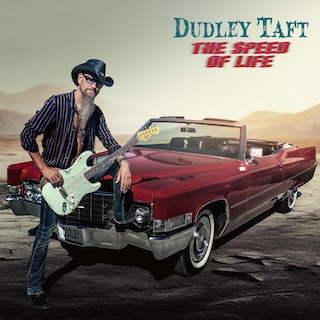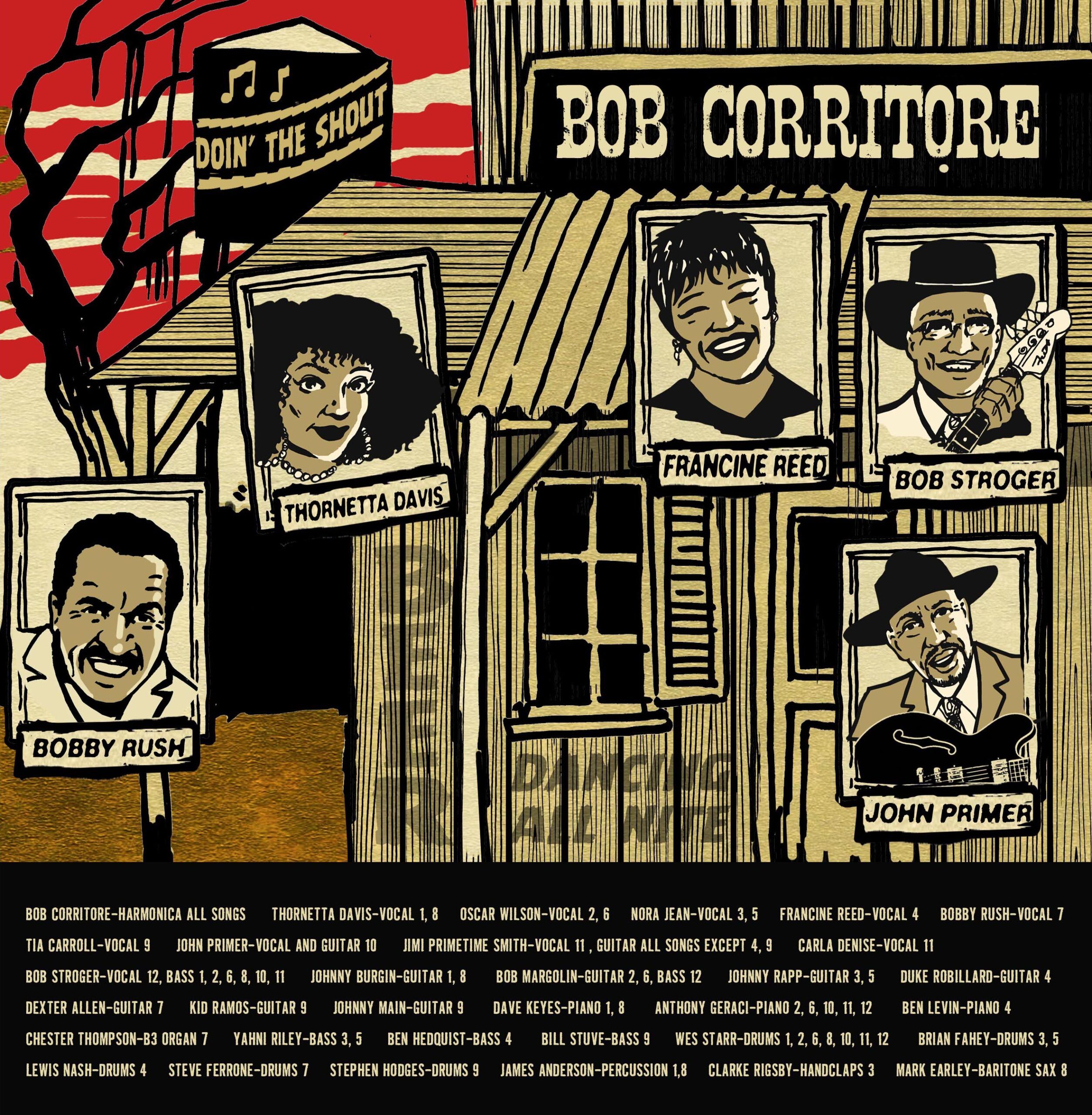
Johnny Rawls: ‘To make great soul music, you’ve first got to be a great soul person’
Wherein the Classic Soul Flame Burns Bright
By David McGee
 MAKE THEM DANCE
MAKE THEM DANCE
Johnny Rawls
CatFood Records
Now 73 years old and a professional musician since the age 15, Mississippi native Johnny Rawls finds himself not only not slowing down but actually making the finest music of his long career—and as the album cover shot attests, looking very sharp while doing so. He’s the keeper of classic soul music’s flame, and in his work is abundant evidence of his style never going out of style. The gospel foundation is there in his delivery and in the background singers’ complementary cries, the heat and the sultriness of the horns is ever present, the guitar is always expressive and colorful in tone and texture, and his songwriting burrows deep into the human experience with love and loss, exultation and despair. Maybe all you need to know about Johnny is that he was the late, great O.V. Wright’s band leader for half a decade before Wright’s passing (and kept the band together as the Ace of Spades for another 13 years), followed by another tenure as Johnnie Taylor’s band director, and the spirit of both, especially O.V., is strong in him. (O.V. was the subject of Rawls’s justly acclaimed tribute album, Remembering O.V., a 2014 Soul Album of the Year nominee and the occasion for him being nominated as Male Soul Artist of the Year, his 11th and 12th Blues Music Awards nominations.) Add ZZ Hill and Otis Clay to the list of luminaries Rawls has had associations with in the past, and you understand how naturally this music comes to him and how authentically he embodies it.
 “To make great soul music, you’ve first got to be a great soul person,” Rawls proclaimed to The Merucry News reporter Paul Freeman in a 2016 interview. “You can’t be from Berkeley, California, and then all of a sudden become a soul singer. You know what I mean? Like I can’t be a country-western singer. You have to live that life, be brought up in that way.”
“To make great soul music, you’ve first got to be a great soul person,” Rawls proclaimed to The Merucry News reporter Paul Freeman in a 2016 interview. “You can’t be from Berkeley, California, and then all of a sudden become a soul singer. You know what I mean? Like I can’t be a country-western singer. You have to live that life, be brought up in that way.”
Everything good about Johnny Rawls informs his Jim Gaines-produced Make Them Dance, wherein he keeps the faith with the eternal verities of his art. The subtext here is the album being the final will and testament of Gaines, beloved and acclaimed for his work over decades with a Hall of Fame roster of artists (Steve Miller, Santana, Stevie Ray Vaughan and John Lee Hooker’s Grammy winning The Healer leading the short list of his achievements), who died shortly after completing these sessions, which rank with the richest of his own lengthy career. What have Rawls and Gaines wrought then? For starters, the title might be meant to be ironic. Yes, there are all manner of grooves to write home about: the album opening “So Cold,” despite spotlighting a gent feeling the chill of his partner’s waning passion, and wondering, “How you get so cold, baby?”; “Give It To Me” and “Rip Off the Bandage” all cook in their own ways with heated passions best worked out on the dance floor, driven by pumping horns and sizzling, emotional guitar solos courtesy Will McFarlane. These songs, the latter two co-written by Rawls and. CatFood label head Bob Trenchard (who also plays bass on the album), lament love fleeing in the wake of infidelity or ennui or simply not trying hard enough, and all burn with gripping intensity of feeling flowing from the music’s muscular drive.

The gospel foundation is there in his delivery and in the background singers’ complementary cries, the heat and the sultriness of the horns is ever present, the guitar is always expressive and colorful in tone and texture, and his songwriting burrows deep into the human experience with love and loss, exultation and despair.
On the other hand, it could be argued that the most striking moments on Make Them Dance are the more introspective, searching ones. Consider the smoldering come-hither love ballad, “Move in My Direction,” a heartfelt plea for something more than friendship, as Rawls wonders, “There must be a reason that you always call me when you’re lonely/I can’t help but wonder if you ever come to see, come to see me/that I’m your answer and I just can’t pretend that all I want to be is your friend…” One of the album’s most stirring moments, it’s sax-enriched by Andy Roman and replete with sultry background vocals by Kimberly Horton and Trinecia Butler to which McFarlane adds wounded, tear-stained guitar to underscore Rawls’s plight (the song is co-written by Gaines’s widow, Sandy Carroll, a fine singer in her own right). Elsewhere, listeners can move in Johnny’s direction through his wry observations on income inequality—meaning his dollars are stretched thin trying to satisfy his beloved’s tastes—in the thick, heartbeat rhythm and protesting horns of “Costs Too Much.” Even better, ranking with Rawls’s finest performances in fact, the cautionary midtempo ballad “Swimming with the Sharks” offers his wounded, deep-blues recollection of a gal who delighted in living on the edge, a drama rich in unsettling gravitas, thanks to soaring horns, foreboding organ, crying guitar and a Latin-esque taste of congas. So yes, grooves aplenty here, amidst a mess o’ truth the great soul person that is Johnny Rawls imparts about life its ownself in more anguished terms, musical and lyrical, the better to examine the state of one’s own soul in the wee, wee hours of a morning.
***

Dudley Taft: ‘…don’t tear it down when you can build it higher’ (Photo: Stefan Schipper)
Taking Stock at the Speed of Life
By David McGee
 THE SPEED OF LIFE
THE SPEED OF LIFE
Dudley Taft
American Blues Artist Group
If you’re mad as hell and you’re not going take it anymore, then Dudley Taft might be your Santa Claus. That goes for anyone who’s fed up with others, fed up with the Roman farce that’s become the state of the Union, and especially fed up with yourselves—enter Dudley, a guitar slinging Paddy Chayefsky for troubled times. Herein the great-great-great grandnephew of 27th U.S. President William Howard Taft is joined in fury by his European touring section of drummer Nick Owsianka and, on bass, percussion and keyboards, his co-producer Dave Marks, with further support by keyboardist Bennett Holland and, on backing vocals, Ashley Charmae and Gina McCann. (Dudley’s familial connection to a Chief Executive gives him ranking above Sierra Hull among famous musician related to famous politicians. Sierra is a distant cousin of Cordell Hull, the longest serving U.S. Secretary of State, who held the office for 11 years under FDR and was, among many other achievements, an architect of the United Nations, for which he won a Nobel Prize for Peace.)

‘Work It Out,” Dudley Taft, from The Speed of Life

‘No Yesterdays,’ Dudley Taft, from The Speed of Life
Save my soul, rock ‘n’ roll/I need that feeling. So sings Dudley on this guitar-driven blitzkrieg that sounds torn from unsparing personal reflection. As much as he addresses those in his orbit, Taft seems mostly auditing his own soul. Based on the fire and fury of the sonics supporting the gripping commitment of arguably his finest recorded vocals, missives such as “Work It Out,” all anthemic strum und drang with its pounding percussion, merciless guitar sorties and fierce ostinato chanting, in which his bold-face admonishments seem aimed as much at himself as at others when he commands, “You know this isn’t what the doctor ordered/your wheels are spinning and you burned up the motor/you need to get away, but you can’t leave/and I say work it out!”; the fiery, apocalyptic vocal buttressed by the banshee guitar wailing that is “Burn It Down” in which he bemoans “chasing the same old dream” and further counsels, “You gotta take stock, cut your losses/make a plan execute it, and quick on your feet…right now!”; and, in a bit of black humor, the sizzling “No Yesterdays” in which he observes, “The good life was shown to us on TV/but in real life it would make our credit cards bleed…no yesterdays,” well, it appears the artist is giving new meaning to scales falling from one’s eyes, as he closes with an affirmative benediction, to wit: “The road ahead doesn’t stretch on forever/take a long ride only if you are clever/and know what’s good for you and what lights your fire/don’t tear it down when you can build it higher.” Again, self-help doubling as a form of therapeutic counseling.

‘No Time Left (Long Live the King),’ Dudley Taft, from The Speed of Life
For good measure, he closes with a thundering, punishing screed, “No Time Left (Long Live the King),” warning of looming disasters both ecological and metaphorically sociological, and possibly political. Blazing away, Dudley rages against a world on fire: “Brown haze fills sthe sky, things are different now/every year temperatures rise, will it cool back down?/now we’re running off the edge of a cliff, here we all go/and we can’t see anything that lies below…can you hear the clock tick? How much time left?”
Witness Dudley Taft, taking stock at the speed of life. Yes, rock ‘n’ roll, we need that feeling indeed.
***

A few of Bob Corritore’s friends, as heard on Doin’ the Shout!
Manifesto of Mutual Misery
By David McGee
DOIN’ THE SHOUT!
Bob Corritore & Friends
VizzTone/SWMAF Records
One of the foremost exponents of Chicago blues, Bob Corritore relocated to Arizona in the ‘80s but continues to champion the Windy City ethos, especially in the enduring series of & Friends projects. Doin’ the Shout! is no exception, and only the latest in a long line of outstanding long players (with the most striking covers around) featuring some of the most beloved blues veterans of our time.

‘My First Love,’ an autobiographical blues ballad written and performed by 94-year-old bassist Bob Stroger, with Bob Corritore on harp, Jimi ‘Primetime’ Smith on guitar, Anthony Geraci on piano, and Steady Rollin’ Bob Margolin on bass. From Doin’ the Shout! by Bob Corritore & Friends

‘Woman Wanted,’ lead vocal by Oscar Wilson from Doin’ the Shout! by Bob Corritore & Friends
This latest installment offers a possibly conceptual conceit quite distinct from its & Friends predecessors. It’s about evenly split between male and female headliners with outstanding instrumental support, all deeply invested in the personal trials and tribulations common to the genre’s fabled texts. The males sing the mean woman blues, but not exclusively: you’d have to say Bobby Rush (now 91) suffers from self-inflicted wounds in his “I’ve Got Three Problems” when he bemoans “my woman, my girlfriend, and my wife” all turning on him for reasons he’s not quite yet fathomed. And the Genies thought they had problems in 1959 when lead singer Claude Johnson complained “I got myself in an awful fix/when I got involved with those two chicks” in the early R&B classic, “Who’s That Knocking.” Ninety-four-year-old bassist Bob Stroger, in addition to having a strong instrumental presence in the backing bands, closes the album on a tender note with his autobiographical blues ballad, “My First Love,” a reminiscence both warm and earthy with a lusty undercurrent in the soundscape fashioned by Jimi “Primetime” Smith on guitar, Anthony Geraci adding emotional piano support, Corritore moaning on harp and none other than Steady Rollin’ Bob Margolin on bass. Corritore’s buddy John Primer, now 80, recipient of a Deep Roots Album of the Year honor in 2022 for his Hard Times gem, contributes a wise and witty rocker, “Twenty Room House,” its fierce shuffle belying Primer’s deep blue lament over losing the woman who made the house, once a home , now a haunting presence in the singer’s life, while behind him Corritore blows hard and fierce, Primetime fashions slice and dice upper neck guitar solos, and Geraci romps energetically across the 88s in embroidering the narrative with honky tonk and barrelhouse atmospherics. It falls to Chicago south side native Oscar Wilson, the Cash Box Kings’ powerful husky-voice vocalist, to really bring the Windy City style hard and heavy to the project, twice in fact, with a couple of long, gone lonesome Muddy Waters-style grinders in “Woman Wanted” and the abject loneliness he confesses to in “Just a Dream.”

‘That Don’t Appease Me,’ lead vocal by Thornetta Davis, from Doin’ the Shout! by Bob Corritore & Friends

‘It’s My Life,’ lead vocal by Nora Jean Wallace, from Doin’ the Shout! by Bob Corritore & Friends
But in Corritore’s Manifesto of Mutual Misery the women take no prisoners, pull no punches, show no mercy. Chicago’s Francine Reed gives a master class in broken-hearted blues vocalizing with “I Guess I’m a Fool,” her poignant pleading given extra ballast by the lowdown guitar-piano-harp support by guest Duke Robillard, Geraci and Corritore. Nora Jean Wallace simply rocks and wrecks the house twice, once with a muscular workout on the title track, a Nora Jean original that rolls and tumbles riotously with Corritore’s harp muscular and frisky, a second voice shadowing the artist as she rises into full-on hand clapping, foot stomping gospel fervor; later she returns, memorably so, with a gritty assertion of self-reliance, “It’s My Life,” with the band in a fury behind her, especially the howling slide guitar punctuating her forthright vocal shouts. Originally from the Bay Area, transplanted to Phoenix, Tia Carroll takes “I’ve Got to Be With You Tonight” into territory both sensual and sensuous, bemoaning the man who got away even as she lusts after him, as Primetime’s razor-edge soloing becomes the instrumental complement to her smoldering passion. Detroit’s Thornetta Davis brings her lively attack to the no-holds-barred kiss-off album opener, “Say Baby Say,” a tune dating back to 1952 when Alberta Adams, who wrote the number, joined T.J. Fowler in recording it for the Cannonball label. To Thornetta goes the honor of laying waste to a philandering bum in the pitiless putdowns of “That Don’t Appease Me,” wherein she decries the object of her ire as an “evil man, a dirty, dirty man” and Primetime emphatically underscores the sentiments with a tough, stinging solo.“Get the heck on outta here,” she orders in one of several no-nonsense spoken dismissals, but the slight quaver in her voice betrays the hurt her anger and the uptempo vibe barely disguises. Multi-layered and multi-textured, these bravura vocal displays are nothing less than wondrous.
Recorded in sessions spanning two years, Doin’ the Shout!, like all Corritore entries, underscores the blues’ timeless quality. Every tune honors and upholds Willie Dixon’s famous maxim: “The blues is about life. If it ain’t about life, it ain’t the blues.” Lots of life herein. Lots of life.


